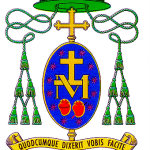Deaneries
- Home
- Deaneries
Deaneries in the Diocese of Kumba
A deanery is an assembly of parishes into a geographical group within a Diocese. It is a subdivision of the diocese made up of a number of parishes and it is created by the Bishop and put under the care of a dean. The creation of deaneries basically is to serve the purpose of administration. It is therefore a means of helping the diocesan Bishop carry out one of his three main functions which is governance. It is obvious that no Bishop can be everywhere at the same time, the Code of Canon thus makes provision for him to group his diocese, which is usually a large surface area into deaneries and appoint deans who will act as his representative and help oversee the parishes in the deanery ensuring that things function properly. Deaneries are known in Universal Canon Law as Vicariate Forane. (Cf Canons 555)
Upon creation of the Diocese of Kumba on 15th March 2016 by His holiness Pope Francis there were three deaneries existing as was the case when Kumba was still under the Diocese of Buea and these were: Kumba deanery, Mundemba deanery and Tombel deanery.
This division took into consideration the three main divisions that make up this diocese: Meme division, Ndian division and Kupe-Muanenguba division respectively. Kumba Diocese has a total surface area of 11,430 sq km and at creation boasted of a catholic population of 206,000 and 20 parishes.
The Bishop of Kumba Mgr Agapitus Nfon, who is the pioneer and present Bishop of the diocese, has since created five new pastoral zones: Ikiliwindi, Bai Kuke, Mbongo, Ebonji and Ekombe Mbonji respectively. This has also come with the split of Kumba deanery into two deaneries: Kumba Town and Fiango Deaneries respectively.
Hence the number of deaneries in the Diocese as at now, 2023 is four.
Here are the names of the Deaneries and the parishes and parochial zones that make up these deaneries.
• St John parish, Kumba Town.
• St Anthony parish, Kumba Mbeng.
• St John Paul II parish, Barombi kang.
• St John the Baptist parish, Mbalangi.
• St Peter Claver Parish, Barombi.
• St Paul Parish, Kwa Kwa.
• St Michael Pastoral zone.
Fiango Deanery
• Sacred Heart Cathedral parish, Fiango.
• St Agnes Parish, Kosala.
• St Thomas Parish, Ntam.
• St Peter pastoral zone, Ikiliwindi.
• St Peter the Rock Parish, Ngolo bolo.
• St Luke parish, Nyandong.
Tombel Deanery
• Our lady of Good Counsel parish, Tombel.
• St Michael the Archangel parish, Baseng.
• Ave Maria parish, Bangem.
• St James pastoral zone, Ebonji.
Mundemba Deanery
• St Paul Parish, Mundemba.
• Our Lady Queen of Apostles parish, Ikassa.
• St Michael the Archangel parish, Isangele.
• St John Bosco parish, Mbonge.
• St Martin de Porres parish Bekora.
• St Peter and Paul, Ekondo titi.
• St Peter pastoral zone, Bai Kuke.
• St Peter and Paul pastoral zone, Mbongo.
Activities and Functioning of the Deaneries
As earlier mentioned, the deanery is led by a dean a word derived from the Latin decanus referring to a leader in charge of ten people. The dean is appointed by the Bishop who relies firstly on the election of the priests in the particular deanery. Deans otherwise called vicar foranes do not possess the same power of governance as the Bishop and other principal Episcopal vicars of the Diocese but as Canon 555 stipulates, they are close collaborators with the Bishop in the pastoral care of the faithful and are to be the link between the Bishop and the priests in the deanery ensuring that they live in conformity with their state and that parochial discipline is duly observed, particularly with regard to the liturgy. They are to assist the Bishop in visiting the parishes in the deanery at least once a year and check the registers (Cf canon 396-398).
In the Diocese of Kumba all the deans are ex-officio members of the Diocesan Presbyteral Council and do present reports about pastoral life and activities of parishes in their respective deaneries.
Below are some of the activities they coordinate and that are carried out in the deaneries which often form the basis of their reports:
• Organization of enlarge deanery meetings including the priests, religious, catechists, other pastoral workers and members of the laity.
• Organization of Priests and Religious meetings, recollections, sporting and social gatherings like meals and celebration of birthdays and feast days.
• Implementation of the Provincial Pastoral Plan: formation of Commissions at the deanery level and election of commission leaders at the deanery.
• Organization of deanery pastoral weeks.
• Coordination and organization of deanery and diocesan pilgrimages.
• Preparation of the Liturgy at deanery and diocesan events like priestly and diaconate ordinations, Chrism Mass, Diocesan Feasts, Diocesan pilgrimages and Final Professions.
• Setting up of good deanery choirs and training of choristers.
• Resolution of disputes and conflicts within parishes, and pastoral workers in the deanery.

